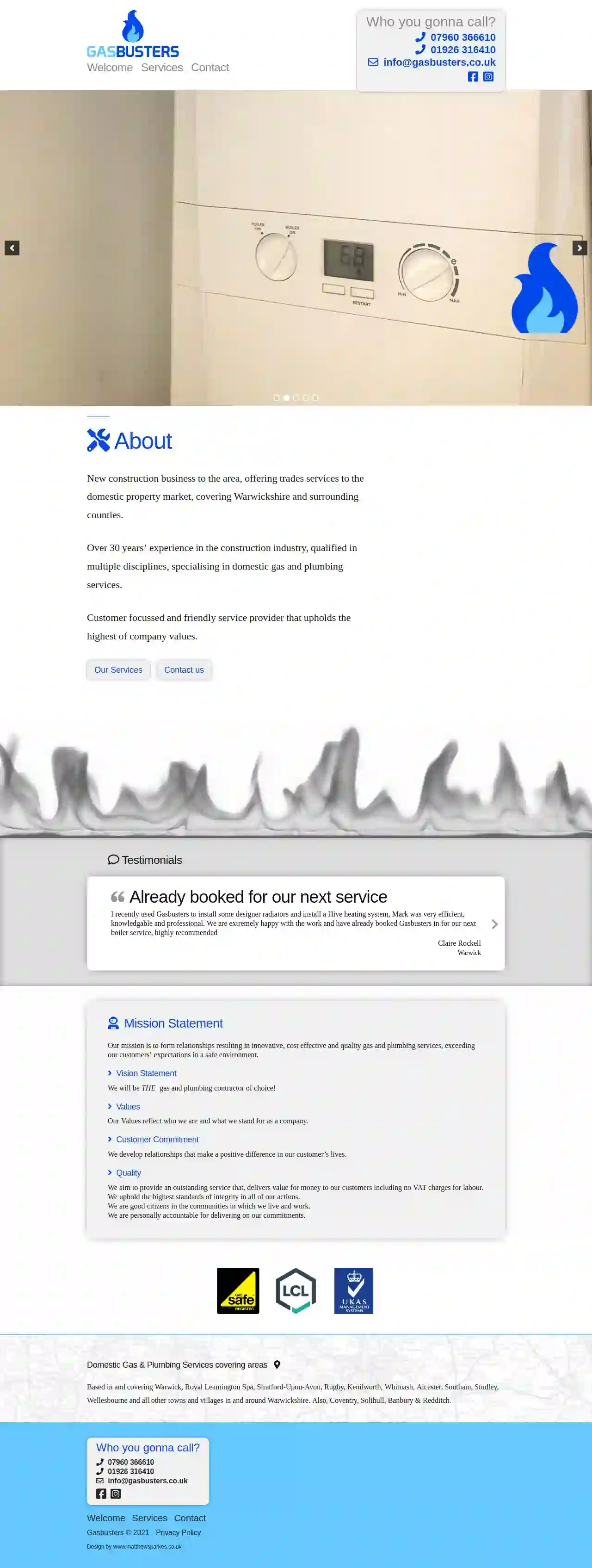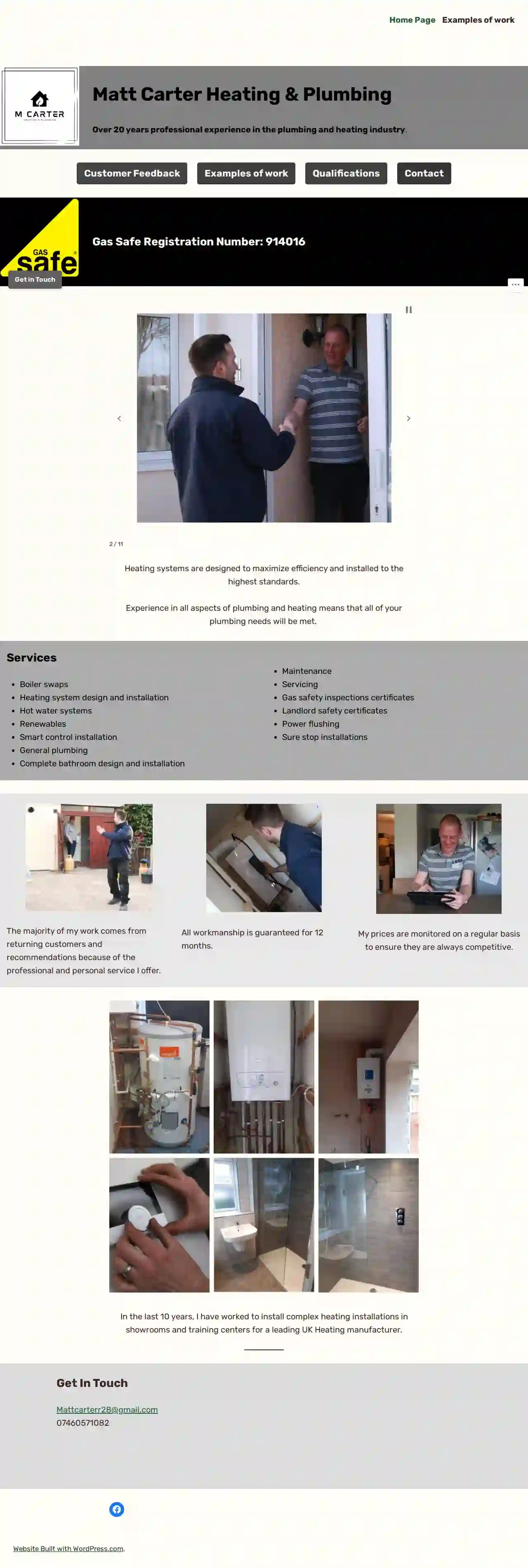Emergency HVAC Water Orton
Top Emergency HVAC Service in Water Orton
Receive up to 3 Emergency AC Repair quotes for your project today! Compare profiles, reviews, accreditations, portfolio, etc... and choose the best offer.

Gasbusters
Unit 1, Warwick Business Centre, Warwick, CV34 6AA, GBNew construction business to the area, offering trades services to the domestic property market, covering Warwickshire and surrounding counties. Over 30 years’ experience in the construction industry, qualified in multiple disciplines, specialising in domestic gas and plumbing services. Customer focussed and friendly service provider that upholds the highest of company values.
- Services
- Why Us?
- Our Team
- Testimonials
- Gallery
Get Quote
Assist Heat
4.33 reviews66 Norman Ave, Nuneaton, CV11 5NY, GBAssist Heat – Emergency Plumber – Nuneaton is a family run plumbing business, providing Nuneaton area with a friendly professional service for all your plumbing and boiler repair requirements. Our 24 hour emergency plumber colchester. With locally based engineers covering these areas, Assist Heat – Emergency Plumber – Nuneaton specialize in all types of Plumbing services including Emergency Plumbing call outs, Boiler Repair, Boiler installation, Boiler servicing and full heating installations. Assist Heat – Emergency Plumber – Nuneaton pride ourselves as being one of the area’s premier 24 hour emergency Plumbing companies. When a problem occurs that requires an immediate response we offer complete solutions including Boiler repairs and waterleak repairs throughout Nuneaton 24 hours a day, 365 days a year. Highly skilled local Plumbers are on standby with fully equipped vans containing all the necessary equipment to carry out any Plumbing service. With our local Nuneaton engineers you know you’re in safe hands. We have had many recommendations through word of mouth. This is due to our policy of putting customer satisfaction as well as safety, above all else. Please contact one of are friendly office staff now to book a appointment.
- Services
- Why Us?
- Accreditations
- Gallery
Get Quote
M Carter Heating and Plumbing Ltd
551 reviewsWarwick, GBOver 20 years professional experience in the plumbing and heating industry. Heating systems are designed to maximize efficiency and installed to the highest standards. Experience in all aspects of plumbing and heating means that all of your plumbing needs will be met.
- Services
- Why Us?
- Our Team
- Gallery
Get Quote
A Rated Heating Services Ltd
519 reviewsThe Old School House, Arrow, Alcester, B49 5PJ, GBAt A Rated, we understand that your home or business is your most important asset, which is why we offer a range of plumbing, gas, and heating services to help you keep it running smoothly. Whether you're dealing with a blocked drain, a gas leak, or a faulty heating system, our team of qualified and experienced engineers can help you get back to your normal life as quickly as possible. We pride ourselves on our reliable and friendly service that customers can trust. Our expert team are on call 24/7 for any plumbing emergency. Our approach has been simple. Provide a competitive price using qualified plumbers with no hidden fees backed by a 100% guarantee on workmanship. Our plumbers are available now for any plumbing repairs or installation services for your home or business.
- Services
- Why Us?
- Accreditations
- Our Team
- Testimonials
- Gallery
Get Quote
Stuart Chalmers Gas & Heating
4.843 reviews16 Ridgewood Close, Royal Leamington Spa, CV32 6BW, GBI am proud to provide customers with a full range of high quality boiler installation and maintenance services. Excellent customer service from an engineer you can trust. The business is lead by Stuart Chalmers who has 15 years experience in dealing with a full variety of gas and heating systems having trained with British Gas. Stuart has always been focused on providing outstanding customer care and works only to the highest standards. Stuart Chalmers Gas & Heating provides a reliable and trustworthy service to clients undertaking jobs of all types. BOILER REPLACEMENT I've fitted countless boilers over the years. If you chose to work with me, I will always do the job correctly, without cutting corners, which saves you money in the long run. BOILER SERVICING This is all about keeping you and your family safe. I will check your boiler for safety and that it’s all operating as it should be, keeping you warm when you need it most. BOILER MAINTENANCE As a former British Gas Engineer, I am highly trained as a breakdown engineer meaning I am able to test components and diagnose where the problem lies. GAS SAFETY CHECKS I am Gas Safe registered and qualified to work on Natural Gas and LPG, Boilers, Cookers, Fires and Warm Air Units. Stuart Chalmers Gas & Heating Engineer I trained with British Gas and have over 15 years of relevant and varied industry experience, working with a full range of systems and installations for both domestic applications. As a registered Gas Safe engineer, I'm qualified to install and sign off installations and maintenance jobs to a high level of safety. I pride myself on the high levels of integrity and customer service that my business is founded on. Check out my recent reviews to see what my customers have to say...
- Services
- Why Us?
- Accreditations
- Our Team
- Testimonials
- Gallery
Get Quote
PPS Gas & Electric (Plumbing and Heating)
58 reviewsStratford-upon-Avon, Stratford-upon-Avon, Warwick, Leamington, and surrounding areas, GBPPS Gas & Electric Ltd is a family business established in 2005, catering for private and business customers. We are the preferred contractors for four of the more reputable property letting agents in the Stratford upon Avon, Warwick and Leamington Spa areas. We aim to provide a high-class service, including gas, oil and electric boiler installation, servicing and repairs, landlords and homeowners gas, electrical and oil safety inspections, plumbing repairs, electrical repairs, un-vented hot water cylinder work, heating system cleaning by 'power flushing', and general plumbing. We cover Stratford-upon-Avon, Warwick, Leamington, and surrounding areas.
- Services
- Why Us?
- Accreditations
- Gallery
Get Quote
Robert Carter Heating and Plumbing
55 reviews123 High Street, Grimsby, DN37 9AA, GBRobert Carter Heating & Plumbing is a family-run business with over 25 years of experience in the heating and plumbing industry. We pride ourselves on providing a reliable and professional service to all our customers. We are Gas Safe registered and fully insured, giving you peace of mind that you are in safe hands. We offer a wide range of services, including boiler installations, repairs, servicing, and plumbing work. We cover all areas of North East Lincolnshire and surrounding areas. Our team of experienced engineers are dedicated to providing a high-quality service at competitive prices. We are committed to customer satisfaction and will always go the extra mile to ensure that you are happy with our work. Contact us today for a free quote.
- Services
- Why Us?
Get Quote
QVAC Ltd
West Midlands, United Kingdom, Sutton Coldfield, B74, GBAt QVAC, our mission is simple: to create comfortable climates that elevate the standard of living and working environments across domestic, commercial, and industrial buildings. By adhering to our core principles of safety, functionality, and design, we strive to deliver HVAC solutions that are not just innovative but also integral to achieving optimal indoor comfort. With every project we undertake, we are committed to transforming spaces into comfortable, efficient, and visually appealing environments. Trust QVAC to bring unparalleled climate control to your space. Learn More. Budget-friendly and prompt HVAC services.
- Services
- Why Us?
- Gallery
Get Quote
Indoor Climate Systems (UK) Ltd
New Road, Office 8, Malvern House, Solihull, B91 3DL, GBIndoor Climate Systems (ICS) is a leading UK mechanical services provider, specializing in creating controlled environments for commercial and industrial sectors. Established in 1992, ICS is privately owned and run by engineers, emphasizing project delivery and quality engineering expertise. The company boasts preferred contractor status with numerous clients and a high rate of repeat business, a testament to their performance. ICS takes pride in its team of highly qualified design engineers with over 100 years of combined onsite project management experience. ICS is certified in ISO9001 and ISO14001 and is a member of Constructionline. Their commitment to client satisfaction is evident in their 'TAKE TIME' initiative, a tailor-made plan ensuring snag-free, defect-free, on-time project completion. This involves meticulous design checks, proactive site snag management, dedicated commissioning managers, and comprehensive O&M manuals. ICS offers a comprehensive range of services, including design, build, specification, and drawings, utilizing the latest technologies like BIM, Revit, and AutoCAD 3D. They excel in project management, installation, and coordination with existing services and other trades, ensuring seamless integration. Detailed site surveys are conducted at the project's outset to guarantee accuracy in their drawings. ICS builds long-lasting relationships with clients and consultants based on high-quality service, a professional environment, and exceptional installations.
- Services
- Why Us?
- Accreditations
- Gallery
Get Quote
Chillaire Ltd
512 reviewsAttleborough Fields Industrial Estate, Unit 1, Veasey Close, Nuneaton, CV11 6RT, GBChillaire is a leading provider of air conditioning, heating, and ventilation solutions for all applications. Based in the heart of England, we have various offices in surrounding areas, from where we provide a national service through our locally and remotely located engineers. Our team of experts is dedicated to delivering high-quality solutions that meet the unique needs of our clients. With a wide range of services, including consultancy, design, sales, service and repair, installations, maintenance, and hire, we are the perfect partner for all your HVAC needs.
- Services
- Why Us?
- Testimonials
- Gallery
Get Quote
Over 12,692+ HVAC Companies in our network
Our HVAC contractors operate in Water Orton & surrounding areas!
HVACCompaniesHub has curated and vetted the Best HVAC Businesses arround Water Orton. Find a reliable pro today.
Frequently Asked Questions About Emergency HVAC Services
- Safety First: If you suspect a gas leak or any electrical hazard, evacuate your home or building immediately and contact your utility company or emergency services.
- Turn Off Your System: Turn off your HVAC system at the thermostat to prevent further damage.
- Document the Issue: If possible, take photos or videos of the problem to show the technician.
- Gather Information: Have your HVAC system's model and serial number readily available, along with any warranty information.
- Clear Access: Ensure clear access to your HVAC system for the technician.
- Prepare Questions: Write down any questions you want to ask the technician.
What is a zoning system, and do I need one?
What's the difference between a single-stage and two-stage furnace?
How do I find an emergency HVAC technician near me?
What should I do while waiting for an emergency HVAC technician?
What is a zoning system, and do I need one?
What's the difference between a single-stage and two-stage furnace?
How do I find an emergency HVAC technician near me?
What should I do while waiting for an emergency HVAC technician?
- Safety First: If you suspect a gas leak or any electrical hazard, evacuate your home or building immediately and contact your utility company or emergency services.
- Turn Off Your System: Turn off your HVAC system at the thermostat to prevent further damage.
- Document the Issue: If possible, take photos or videos of the problem to show the technician.
- Gather Information: Have your HVAC system's model and serial number readily available, along with any warranty information.
- Clear Access: Ensure clear access to your HVAC system for the technician.
- Prepare Questions: Write down any questions you want to ask the technician.